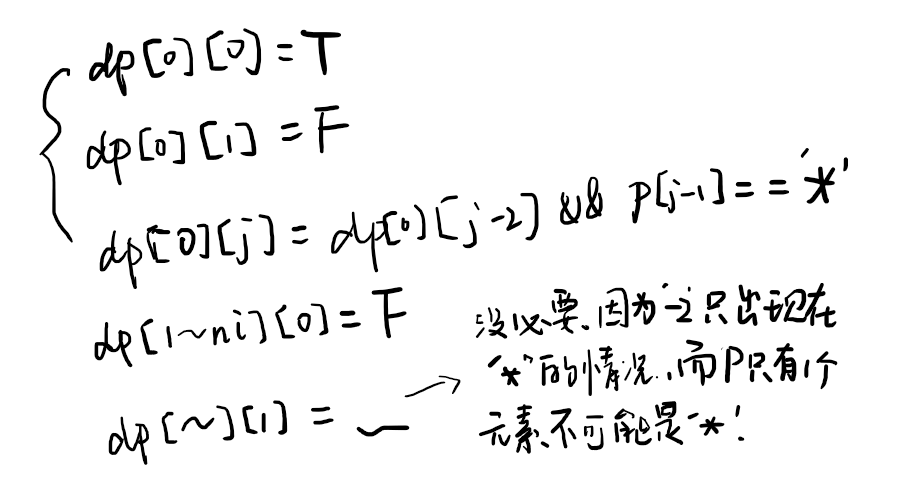Given an input string (s) and a pattern (p), implement regular expression matching with support for ‘.’ and ‘*’.
‘.’ Matches any single character.
‘*’ Matches zero or more of the preceding element.
The matching should cover the entire input string (not partial).
Note:
s could be empty and contains only lowercase letters a-z.
p could be empty and contains only lowercase letters a-z, and characters like . or *.
Example 1:
Input:
s = “aa”
p = “a”
Output: false
Explanation: “a” does not match the entire string “aa”.
Example 2:
Input:
s = “aa”
p = “a*”
Output: true
Explanation: ‘*’ means zero or more of the preceding element, ‘a’. Therefore, by repeating ‘a’ once, it becomes “aa”.
Example 3:
Input:
s = “ab”
p = “.“
Output: true
Explanation: “.“ means “zero or more (*) of any character (.)”.
Example 4:
Input:
s = “aab”
p = “cab”
Output: true
Explanation: c can be repeated 0 times, a can be repeated 1 time. Therefore, it matches “aab”.
Example 5:
Input:
s = “mississippi”
p = “misisp*.”
Output: false
来源:力扣(LeetCode)
链接:https://leetcode-cn.com/problems/regular-expression-matching
著作权归领扣网络所有。商业转载请联系官方授权,非商业转载请注明出处。
框架
1 | class Solution { |
1. 直接遍历
O(n)
失败了……
本来觉得还算简单来着,但是这个 *着实气人,它想匹配多少就匹配多少,连 a*a都有。。
下面的代码是错的,没有考虑这种智障输入。
1 | class Solution { |
2. 动态规划
因为不能确定 *到底匹配多少个前一个字符,所以可以都测试一下。
设 bool dp[i][j]用来代表 s的前 i个字符和 p的前 j个字符的匹配关系,也就是 s[0 ~ i-1]和 p[0 ~ j-1]
那么 dp[i][j]就可以依靠前面 dp[][]的 True/False决定,表示后半部分匹配,结果由前半部分的匹配情况确定。
以下讨论 dp[i][j],即 s[0 ~ i-1]与 p[0 ~ j-1]的匹配情况。
s[i-1] == p[j-1]dp[i][j] = dp[i-1][j-1]说明p中肯定是字母,并且二者在该位上匹配,所以s[0 ~ i-1], p[0 ~ j-1]这部分是否匹配取决于dp[i-1][j-1]。p[j-1] == '.'dp[i][j] = dp[i-1][j-1]``.可以匹配任何字母,因此二者在该位上也是匹配的,所以如上。p[j-1] == '*'*可以匹配0次或多(>0)次在*左侧的那个字符。s[i-1] != p[j-1-1] && p[j-1-1] != '.'dp[i][j] = dp[i][j-2]
无法匹配,只能匹配0次。else / s[i-1] == p[j-1-1] || p[j-1-1] == '.'
可以匹配,可能匹配0次或多(>0)次。- 匹配0次
dp[i][j] = dp[i][j-2]即便s[i-1] == p[j-1-1]也是有可能匹配0次的,比如s = abc, p = 'abcc*'。匹配0次相当于这个字符和*都不存在了,因此跳过这两个字符,如s = ab, p = abc* - 匹配多(>0)次
dp[i][j] = dp[i-1][j]
匹配k次依赖于匹配k-1次,后者又依赖于k-2次,因此最终就变成了匹配0次,所以步骤就是依赖于dp[i-1][j]
- 匹配0次
else / s[i-1] != p[j-1] && p[j-1] != '.' && p[j-1] != '*'dp[i][j] = false
不匹配。
初始化:

1 | class Solution { |